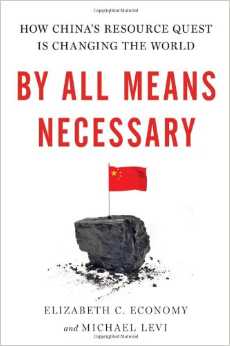
The Motley Fool's energy bureau chief, Joel South, spoke with Michael Levi about his new book, coauthored with Elizabeth Economy, By All Means Necessary: How China's Resource Quest is Changing the World. As the David M. Rubenstein Senior Fellow for the energy and environment at the Council on Foreign Relations, Levi is no stranger to the impact that countries and their decisions have on the rest of the world. In fact, Levi also writes a blog for the CFR, Energy, Security, and Climate, where he discusses the relationship between energy, the world, and its inhabitants. In By All Means Necessary, Levi analyzes the impacts and effects China's resource hunt has on the world and international affairs, specifically looking at the synthesis of economics, security, and politics.
In this part of the interview, Joel South asks Michael Levi about China's situation since his co-authored book By All Means Necessary published in February. Levi notes that two particulars about China offer the persistent importance of the country and necessitate continued observation.
Joel South: Wrapping up a little bit, since the book has been published and you did your research, have you seen anything change, that you would want to add to the book?
Michael Levi: That's a great question. There are two things that you've seen happen. The first is an increasing amount of concern about the future prospects of the Chinese economy.
We talk a bit in the book about what might happen if the Chinese economy went south. You would see consequences, not just for aggregate demand, but for the ability of particular companies to function well, for the way the Chinese military conducts itself, and a host of other areas.
The other big thing you see is an extraordinary surge in concern about local air pollution. That has consequences, both for energy because most of the pollution comes from electricity production and industrial energy use, but also for heavy industry more generally, which drives a lot of China's resource appetite.
China will have a host of different ways that it might address these issues. It might switch from coal to gas. It might try and cut consumption through alternative technologies. It might push people into greater use of scrubbers and boost coal demand slightly as a result.
Each of the different solutions to the environmental problems China is facing will have different consequences for global resource markets, and for Chinese security exposure to those markets. Seeing how China tackles this problem -- which I think is seen as an acute problem among senior Chinese leaders -- will be very important to understanding how this all unfolds.
For the complete interview, click here.





